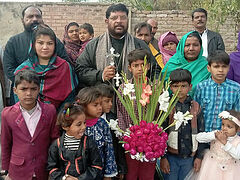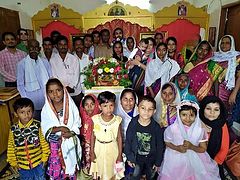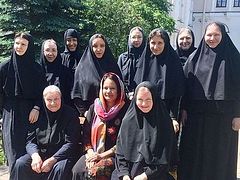A report of the Russian Orthodox Priest Clement Nehamaiyah, rector of the Russian Orthodox Church parish of the Holy Trinity in Chandrapur (India), delivered at the conference, “The External Mission of the Russian Orthodox Church and the Missionary Potential of Culture”, at the Thirty-Second International Nativity Readings, 2024.
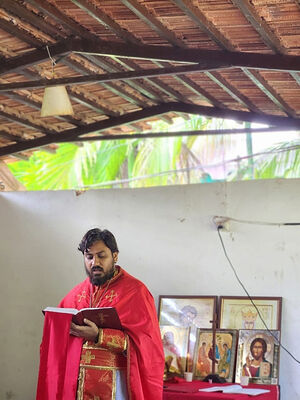 Иерей Климент Нехамайя “Blessed art Thou, O Christ our God, Who hast revealed the fishermen as most wise by sending down upon them the Holy Spirit. Through them Thou didst draw the world into Thy net. O Lover of Man, glory to Thee!” we sing in the troparion to the feast of Pentecost. Christ turned ordinary fishermen into fishers of men and commanded them, who are the very foundation of the Church:
Иерей Климент Нехамайя “Blessed art Thou, O Christ our God, Who hast revealed the fishermen as most wise by sending down upon them the Holy Spirit. Through them Thou didst draw the world into Thy net. O Lover of Man, glory to Thee!” we sing in the troparion to the feast of Pentecost. Christ turned ordinary fishermen into fishers of men and commanded them, who are the very foundation of the Church:
Go ye therefore, and teach all nations, baptizing them in the name of the Father, and of the Son, and of the Holy Ghost: Teaching them to observe all things whatsoever I have commanded you: and, lo, I am with you always, even unto the end of the world. Amen (Mt. 28:19–20).
And so St. Thomas, one of the Twelve Apostles, came to India to bring other sheep, of which Christ spoke, to the True God (cf. Jn. 10:16). Thus begins the history of Christianity in India, sanctified by the blood of the holy Apostle.
Christianity in India was concentrated in the southern part of the country and was a dependent of the Persian Church from the third century. It remained Orthodox for four centuries, and subsequently the Persian Church became Nestorian. From then on Nestorianism was the only form of Christianity in India. In the sixteenth century, Portuguese Catholics arrived in India, who, discovering that Indian Christians were Nestorians, converted many of them to the Catholic faith, laying the foundation of the first Uniate Church in India, known as the Syro-Malabar Catholic Church. Many Indian Christians protested against Roman Catholics and asked Eastern Patriarchs to help them with a bishop. At the same time, in the seventeenth century, non-Chalcedonian Syrian Jacobites came to India. Thus the Jacobite Syrian Christian Church was founded in the country, and then the “Malankara Orthodox Syrian Church”. Later, in the eighteenth and the nineteenth centuries, various Protestant missionaries came to India and planted their denominations.
So far, India has seen the mission of two Orthodox jurisdictions, namely the Ecumenical Patriarchate and the Russian Orthodox Church. In the early twentieth century, Greek Orthodox merchants took up residence in the city of Calcutta in the state of West Bengal. They built a church there and established a Greek Orthodox community in 1924. However, they never undertook any missionary work among Hindus or non-Orthodox. Eventually, in 1972, the church was closed. In 1980, a Greek Orthodox Mission among Indians was set up with the arrival of the Greek Hieromonk Athanasios (Anthidis) from Egypt. He built a church in honor of the Apostle Thomas. In 1990, Fr. Athanasios died. In 1991, Hieromonk Ignatius (Sennis) arrived in West Bengal from Mt. Athos to continue Fr. Athanasios’ work. Soon after his arrival, Fr. Ignatios founded the Philanthropic society of the Orthodox Church, which carried out social services: an orphanage, a school, a hospital, food distribution among the poor, etc. At first, this mission was successful among locals. Currently, the mission is under the jurisdiction of the Ecumenical Patriarchate, but it is no longer being developed, and unfortunately, many of those who converted to Orthodoxy have since defected to different denominations.
In the nineteenth century, two missionaries from the Russian Church visited India. The first Russian Orthodox missionary to arrive in India was Archimandrite Andronicus (Elpidinsky), a Russian emigrant who was sent to India with the blessing of Metropolitan Eulogius (Georgievsky) in Paris. Archimandrite Andronicus stayed in India for eighteen years, from 1931 to 1949, but he did not succeed in his mission. After Archimandrite Andronicus, Archimandrite Lazarus (Moore) from ROCOR came to India. He spent twenty years in India, from 1952 to 1972, but his mission was also unsuccessful and he had to leave India after it became an independent state.
In the twenty-first century, the young Anglican Bishop Rohan Nehamaiyah, my elder brother, appealed to ROCOR with a request to receive him and his community into Orthodoxy. In 2012, the First Hierarch of the ROCOR, Metropolitan Hilarion (Kapral), helped us join the Orthodox Church through His Eminence Metropolitan Mark (Golovkov) from the ROC. In 2018, I was ordained priest. I am making every effort to ensure that the Orthodox mission in India lives on. Today, there are six small communities in different parts of India and about 300 faithful who converted from different faiths and denominations. This is the history of Orthodoxy in India in brief.
Church services are vital for the life of an Orthodox Christian: through them not only do we worship God and participate in the holy sacraments, but also continue to comprehend the depth of our faith and proclaim it. They also serve a missionary purpose. We tell people, Come and see (Jn. 1:46). But in order for them to be amazed by this beauty and depth, the service must be clear—so, translations of services are of great importance. Professional translators can translate historical chronicles or legal texts perfectly, but they cannot translate theological (including liturgical) texts. To translate such texts, an Orthodox mind is needed, as well as a theological and biblical understanding. Unfortunately, we do not have such professional translators in India. That’s why I have undertaken to translate our Orthodox liturgical texts. So far, I have prepared translations of many liturgical texts. Perhaps one day there will be an interest in these translations in our Church, and they will be published; we pray for this. Most of the translations were done in Marathi, which is my native language, and some in Hindi. Unfortunately, out of the hundreds of languages of India I know only two. But depending on the place of worship, we celebrate services in four languages: Marathi, Hindi, English and Church Slavonic. During services all people follow the liturgical books and participate in services actively. Our amateur choir leads people during services, but the whole community acts as a choir.
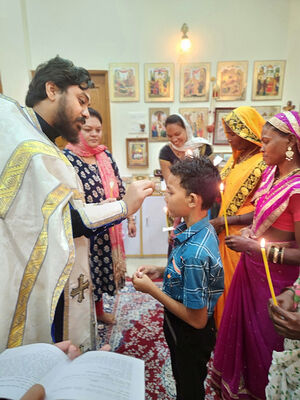 Unction Since we have several Orthodox communities in India, I have to constantly travel to each of them to celebrate the Divine Liturgy. Our communities are located in my city of Chandrapur, in the surrounding villages, in Mumbai, as well as in the states of Rajasthan, Goa and Andhra Pradesh. Traveling to each community takes a lot of time. Therefore, the Liturgy in each of them is celebrated once every three months. Each community has a churchwarden who looks after the community and heads it in the absence of a priest. When there is no Liturgy, the churchwarden reads the typika in the community. Our mission needs priests, so we have already sent a student to the St. Petersburg Theological Academy to study. Two more are preparing for this.
Unction Since we have several Orthodox communities in India, I have to constantly travel to each of them to celebrate the Divine Liturgy. Our communities are located in my city of Chandrapur, in the surrounding villages, in Mumbai, as well as in the states of Rajasthan, Goa and Andhra Pradesh. Traveling to each community takes a lot of time. Therefore, the Liturgy in each of them is celebrated once every three months. Each community has a churchwarden who looks after the community and heads it in the absence of a priest. When there is no Liturgy, the churchwarden reads the typika in the community. Our mission needs priests, so we have already sent a student to the St. Petersburg Theological Academy to study. Two more are preparing for this.
We should take into account that every nation values its culture and does not want to change its culture or replace it with just anything, so we need to be very careful in this matter. Fortunately, Orthodoxy does not carry the idea of domination over any social or ethnic group. We do not export, import or impose one culture on another. On the contrary, we try to sanctify the local culture so that it can be easier for people to understand and accept Christ. Blessed Augustine once asked St. Ambrose of Milan about the differences between Rome’s approach, as opposed to that of Milan. St. Ambrose replied: “When I’m in Rome, I do as the Romans.” Christ came to transform people in His image and likeness, and not to change cultures. The Orthodox faith in Christ is exclusive (on an international scale and compared to other faiths), but the Body of Christ—His Church—encompasses everything, embracing all peoples, languages and cultures. Therefore, in order to win people’s hearts, Orthodoxy must accept their culture and become an integral part of it. For this reason, you may notice differences in how Orthodoxy tries to live in India. Thus, bhakti (devotion) is an integral part of Indian culture, where singing is a means of worship. So, before the beginning of the Liturgy or a lay service we sing hymns of praise, and do the same at the end of the Liturgy. These hymns are sung while clapping and playing traditional Indian instruments. As in Indian culture, similar to the Old Testament, we do not enter a holy place and do not participate in worship without morning ablutions. We also do not enter a holy place in shoes out of reverence for it and leave shoes outside the church. Men and women usually stand separately. We use drums at the beginning of processions. On every major feast we organize a common meal. Instead of wedding rings, women wear traditional neckerchiefs as a sign that they are married.
We are blessed that the Apostle Thomas, who was the first to confess Christ, saying, My Lord and my God (Jn. 20:28), was chosen for a mission in India, and the places associated with him are still available to visitors. Therefore, for us who are unable to make pilgrimages to Israel, these places have become our “Holy Land”. To honor the memory of the holy apostle, experience the past and unite with him, every year we make a pilgrimage to the city of Chennai in southern India. And we invite all of you to join us.
Along with the things we do in our communities that I’ve mentioned, we also try, to the best of our ability, with God’s help, to organize charity events—not only for members of our communities, but for all other people regardless of their faith. We try to do this not only in everyday life and for individuals in special need, but also during crises, as it was during the pandemic. During both waves, we distributed food packages to hundreds of people. When it comes to mission in India, I remember the words of the Apostle Paul: For the Jews require a sign, and the Greeks seek after wisdom (1 Cor. 1:22). And here I would like to add that the Indians demand good works. You probably know that the concept of karma is the most important one in the Indian religions and culture alike.
Indian culture appreciates deeds more than words, so preaching unsupported by deeds in India will not bear fruit and will not attract people’s hearts that way silent deeds can. The Lord says, Let your light so shine before men, that they may see your good works, and glorify your Father which is in Heaven (Mt. 5:16). So why are deeds important? According to Christ, The tree is known by his fruit (Mt. 12:33). Deeds corresponding to preaching are very important for people who have believed in karma for thousands of years. As witnesses of Christ, we must witness to Him not only in word, but also in deed, so that people can not only hear, but also feel for themselves what they hear. For, Faith, if it hath not works, is dead (Jas. 2:17).
Archbishop Anastasios of Albania once justly remarked:
“Just as it is unthinkable to have a Church without liturgical life, it is even more unthinkable to have a Church without missionary life.”
The Apostle Paul says:
For whosoever shall call upon the name of the Lord shall be saved. How then shall they call on Him in Whom they have not believed? and how shall they believe in Him of Whom they have not heard? And how shall they hear without a preacher? And how shall they preach, except they be sent? As it is written, How beautiful are the feet of them that preach the Gospel of peace, and bring glad tidings of good things! So then faith cometh by hearing, and hearing by the word of God (Rom. 10:13-15, 17).
It is deplorable that India is perhaps the only country where the Apostle Thomas preached and suffered, and which has never been Christian in history, for reasons known to God alone. India needs preachers of the Gospel—not only to pagans, but also to non-Orthodox people—preaching of the Gospel in an undistorted form that does not contradict apostolic teaching. India needs the Gospel of the Truth of the Son of the Living God. Let no one say that Christ is already known to people of various non-Orthodox denominations, whether ancient or modern, because they do not know Christ, but rather those versions of Christ that they (these denominations) themselves created. Christ is one, He is the Truth and is known in His Church as He revealed it, and in it we worship Him with the Father and the Spirit in the Orthodox way. We have this Gospel, protected by the Church and preserved by the blood of the martyrs. The Holy Church of the Kingdom of God is based on the Gospel of Jesus Christ, and the Kingdom of Heaven is like unto leaven, which a woman took, and hid in three measures of meal, till the whole was leavened (Mt. 13:33).
At every Liturgy we sublimely rejoice and confess:
“We have seen the True Light! We have received the Heavenly Spirit! We have found the True Faith! Worshiping the Undivided Trinity, Who has saved us.”
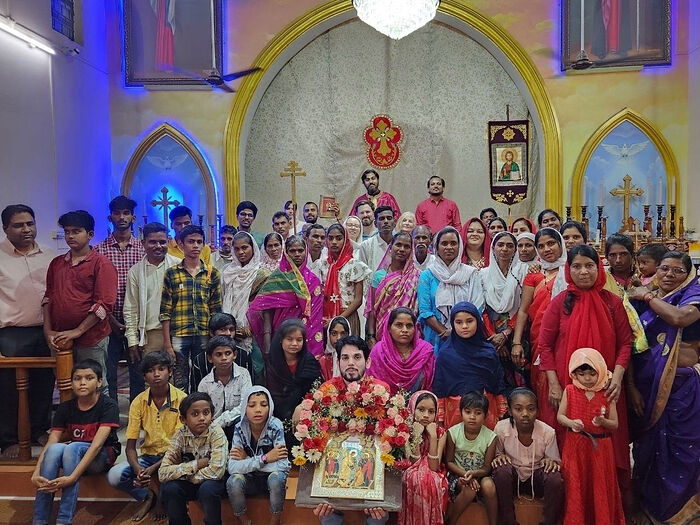 Parishioners of the church of the Holy Trinity in Chandrapur
Parishioners of the church of the Holy Trinity in Chandrapur
We haven’t received the Light of Truth, the Holy Spirit, and the true faith to keep them locked in a chest, but to spread to everyone the Light of Truth, Faith, and Joy that we have received through the Holy Spirit! Therefore, like all the apostles and such Saints as Sts. Cyril and Methodius, Herman of Alaska, Innocent of Moscow and Nicholas of Japan, we must Redeem… the time, because the days are evil (Eph. 5:16) and return to the last commandment of Christ before His ascension:
Go ye therefore, and teach all nations, baptizing them in the name of the Father, and of the Son, and of the Holy Ghost: Teaching them to observe all things whatsoever I have commanded you: and, lo, I am with you always, even unto the end of the world. Amen (Mt. 28:19-20).


